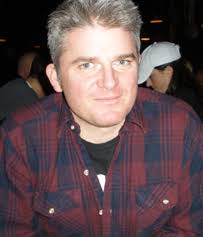 Agent Peter McGuigan of Foundry likes to take an active role in helping his writer’s books become even better. In this interview, he tells us about the steps that he takes to accomplish his goal — to help the writers that work for him be able to live from solely their art.
Agent Peter McGuigan of Foundry likes to take an active role in helping his writer’s books become even better. In this interview, he tells us about the steps that he takes to accomplish his goal — to help the writers that work for him be able to live from solely their art.
What’s your official title and why are you the best agent in the universe?
My title is “Agent” as is the case with all Foundry agents. We don’t do “Jr” or “Sr” or “associate” agents. Once you’re selling books, you’re selling books.
I think what makes us, what makes me, a better agent than most is that I’m pro-active. I like to think I build books, not so much discover them. I think I’ve sold one book in 16 years from the slush pile. I create a lot of work for writers, but that’s because I marry them to good ideas, interesting projects, celebrities and brands, etc. This doesn’t mean I don’t do fiction or narrative non-fiction that starts with a writer’s personal passions — I work on a lot of books like that too. But even then, I can’t recall ever simply hitting “send” on something without seriously working and reworking it to make it better. I guess this is a polite way of implying that we’re not lazy at Foundry — we take chances, sure, but we also do the work to make each of our projects stand out, and believe me they do stand out compared to what some of the competition sends out… or doesn’t send out as the case often is.
Can you tell us a little bit about how you got started as an agent?
I was a bike messenger when I first moved to NYC. I remember taking big, heavy packages of manuscripts and galleys and such into the mailrooms at Harper or WM Morris or Penguin, and realizing that I didn’t go to college to be on this side of the desk. So I like to say I didn’t start in the mailroom, I started outside the mailroom.
Do you think that ebooks and digital publishing are good or bad for books and publishing in general?
I think they’re great! I think the impact is still to be seen, but getting someone to buy and read a book in any form is the point. I’m on my third ebook reader, but I’ve never downloaded a published book — so I can tell you that one impact on the industry is that I bet we’re using a fraction of the paper and ink in our offices that we used to, say, 5 years ago!
What’s the forecast look like right now, economically for the publishing industry? And how would you suggest that writers make a decent living from their work?
It’s a great time to be a writer! This industry has been putting off change for a couple decades and it’s caught up to us, big time. And certain specific things have gotten rougher. For instance, 15 years ago, if you sold a novel to a publisher, somebody out there would option it for film. That’s so rare now. But that’s more about economic changes in a different industry: film. Writing has always been hard and lonely, and there’s only room for a few at the top. Most published writers have second (and third) jobs. Same with musicians, painters … it’s every artist’s goal to live off their art, and it’s our stated aim as agents to help make that happen. But it’s never been an easy gig, so the fact that times are tough now really has less impact on us than, say, if you worked in advertising in a downturn like this one. Ouch.
What kinds of books is your agency looking for right now?
We’re selling a ton of YA. Celebrity books never go out of style. Editors want nonfiction that comes with a platform, so we try to give them that: established names with new ideas. I don’t think there’s anything that we want for, we just need more of it, more good writers with fresh ideas.
If someone’s got something that they want you to see, how should they get in touch with you? What makes you take notice if a query gets sent your way?
I’m the worst person to ask because, as I said, I don’t spend a lot of time reading unsolicited materials. I get a lot of referrals from my top secret sources out there. But I will say I at least glance at every emailed query I get, and the first thing I look for is: experience and platform. A good idea must be paired with the right writer. It’s great if you have a clever idea, but you either have to be the person to write that book, or you need to become that person. Then we might have something. I rarely look at slush fiction submissions, but I do forward them to my colleagues if they’re intriguing.



